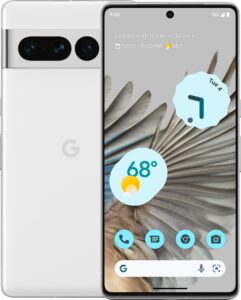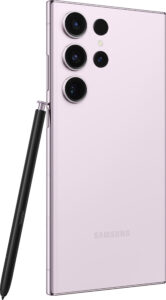Google Pixel 7 Pro and Samsung Galaxy S23 Ultra are two highly anticipated flagship smartphones from Google and Samsung, respectively. Both devices offer top-of-the-line features and specifications. In this article, we will compare the Pixel 7 Pro and Galaxy S23 Ultra to highlight their differences and help you make an informed decision.
Design
Pixel 7 Pro is expected to feature a sleek and minimalistic design with slim bezels and a glass or metal body. On the other hand, the Galaxy S23 Ultra is likely to have a more substantial build with a combination of glass and metal, featuring Samsung’s signature design language.
Display
Pixel 7 Pro is rumored to sport a 6.7-inch QHD+ OLED display with a high refresh rate, offering vibrant colors and excellent contrast. The Galaxy S23 Ultra, on the other hand, is expected to feature a larger 6.8-inch Dynamic AMOLED display with a high refresh rate and HDR10+ support, providing an immersive viewing experience.
Performance
The Pixel 7 Pro is likely to be powered by Google’s custom chipset, offering a seamless and optimized performance for its software. On the other hand, the Galaxy S23 Ultra is expected to be equipped with a powerful flagship processor, delivering exceptional speed and multitasking capabilities.
Camera
Both devices are expected to excel in the camera department. The Pixel 7 Pro is rumored to feature a triple-camera setup with advanced computational photography capabilities, enabling impressive low-light photography and AI-enhanced image processing. The Galaxy S23 Ultra, known for its camera prowess, is likely to offer a quad-camera system with improved low-light performance, optical zoom capabilities, and a range of shooting modes.
Software
Pixel 7 Pro will run on the latest version of stock Android, ensuring a clean and bloatware-free user experience. Google’s software optimization and regular software updates make the Pixel devices stand out in terms of smoothness and security. On the other hand, the Galaxy S23 Ultra will run on Samsung’s One UI, which offers a feature-rich interface with customization options and exclusive Samsung services.
Battery
Pixel 7 Pro is expected to have a decent-sized battery to provide all-day usage, along with fast charging capabilities. The Galaxy S23 Ultra, being the larger device, is likely to feature a bigger battery capacity to meet the power demands of its larger display and advanced features. Both devices are expected to support wireless charging.
Storage
Pixel 7 Pro is rumored to offer multiple storage options, starting from 128GB, but without expandable storage. The Galaxy S23 Ultra, on the other hand, is likely to come with various storage options, including expandable storage via a microSD card slot.
Additional Features
Pixel 7 Pro is expected to feature an under-display fingerprint sensor for secure authentication. It may also offer stereo speakers for an enhanced audio experience. The Galaxy S23 Ultra, on the other hand, is likely to offer additional features such as water and dust resistance (IP68 rating), an under-display fingerprint sensor, stereo speakers, and support for Samsung’s S Pen stylus.
Price
Pricing details for the Pixel 7 Pro and Galaxy S23 Ultra have not been officially announced. However, based on previous iterations and market trends, the Galaxy S23 Ultra is expected to have a higher price tag compared to the Pixel 7 Pro.
In conclusion, both the Google Pixel 7 Pro and Samsung Galaxy S23 Ultra are expected to be feature-packed flagship smartphones. The Pixel 7 Pro may excel in computational photography and software optimization, while the Galaxy S23 Ultra may offer a larger display, a versatile camera system, and additional features like S Pen support. The choice between the two will ultimately depend on individual preferences, budget, and ecosystem preference.
Specifications Google Pixel 7 Pro vs Samsung Galaxy S23 Ultra
| Google Pixel 7 Pro | Samsung Galaxy S23 Ultra | |||||
| Prices | 
|

|
||||
| NETWORK | GSM / CDMA / HSPA / EVDO / LTE / 5G | GSM / CDMA / HSPA / EVDO / LTE / 5G | ||||
| BODY | 162.9 x 76.6 x 8.9 mm (6.41 x 3.02 x 0.35 in) | 163.4 x 78.1 x 8.9 mm (6.43 x 3.07 x 0.35 in) | ||||
| DISPLAY | LTPO AMOLED, 120Hz, HDR10+, 1000 nits (HBM), 1500 nits (peak)
1440 x 3120 pixels, 19.5:9 ratio (~512 ppi density) |
Dynamic AMOLED 2X, 120Hz, HDR10+, 1200 nits (HBM), 1750 nits (peak)
1440 x 3088 pixels, 19.3:9 ratio (~500 ppi density) |
||||
| OS | Android 13 | Android 13, One UI 5.1 | ||||
| Chipset | Google Tensor G2 (5 nm) | Qualcomm SM8550-AC Snapdragon 8 Gen 2 (4 nm) | ||||
| CPU | Octa-core (2×2.85 GHz Cortex-X1 & 2×2.35 GHz Cortex-A78 & 4×1.80 GHz Cortex-A55) | Octa-core (1×3.36 GHz Cortex-X3 & 2×2.8 GHz Cortex-A715 & 2×2.8 GHz Cortex-A710 & 3×2.0 GHz Cortex-A510) | ||||
| MEMORY | No | No | ||||
| Main Camera | 50 MP, f/1.9, 25mm (wide), 1/1.31″, 1.2µm, multi-directional PDAF, Laser AF, OIS
48 MP, f/3.5, 120mm (telephoto), 1/2.55″, 0.7µm, multi-directional PDAF, OIS, 5x optical zoom 12 MP, f/2.2, 126˚ (ultrawide), 1/2.9″, 1.25µm, AF |
200 MP, f/1.7, 24mm (wide), 1/1.3″, 0.6µm, multi-directional PDAF, Laser AF, OIS
10 MP, f/4.9, 230mm (periscope telephoto), 1/3.52″, 1.12µm, Dual Pixel PDAF, OIS, 10x optical zoom 10 MP, f/2.4, 70mm (telephoto), 1/3.52″, 1.12µm, Dual Pixel PDAF, OIS, 3x optical zoom 12 MP, f/2.2, 13mm, 120˚ (ultrawide), 1/2.55″, 1.4µm, Dual Pixel PDAF, Super Steady video |
||||
| Front Camera | 10.8 MP, f/2.2, 21mm (ultrawide), 1/3.1″, 1.22µm | 10.8 MP, f/2.2, 21mm (ultrawide), 1/3.1″, 1.22µm | ||||
| Battery | Li-Ion 5000 mAh, non-removable | Li-Ion 5000 mAh, non-removable | ||||
| Colors | Obsidian, Snow, Hazel | Phantom Black, Green, Cream, Lavender, Graphite, Sky Blue, Lime, Red, BMW M Edition |